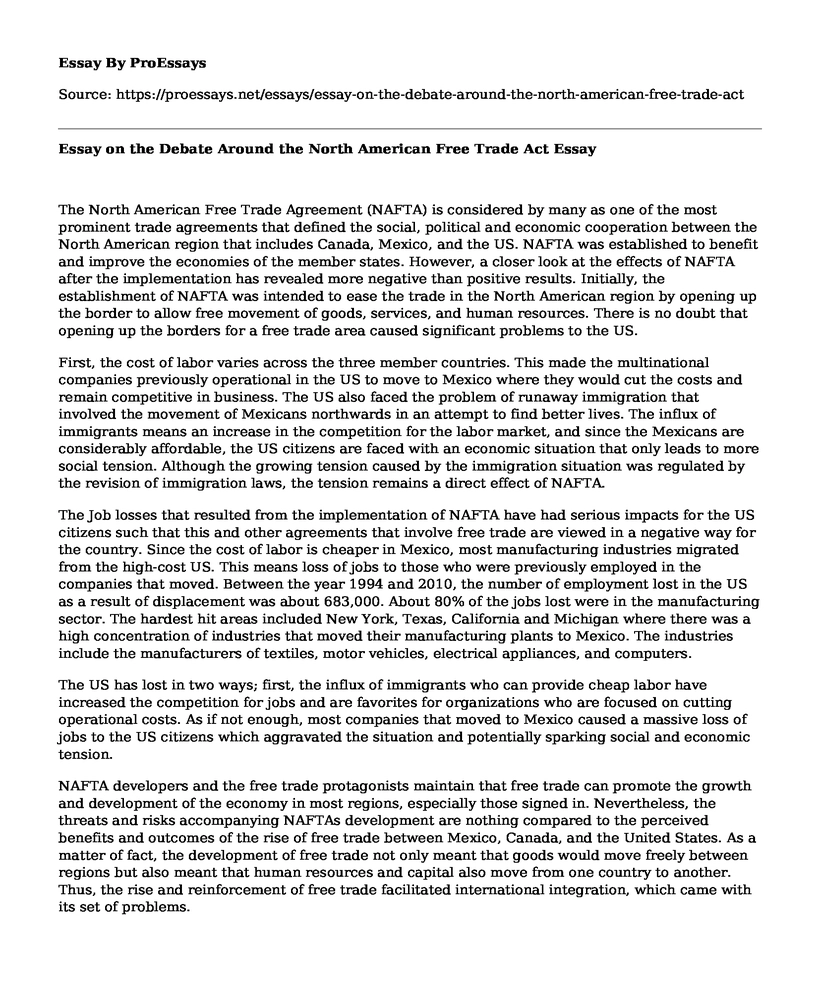The North American Free Trade Agreement (NAFTA) is considered by many as one of the most prominent trade agreements that defined the social, political and economic cooperation between the North American region that includes Canada, Mexico, and the US. NAFTA was established to benefit and improve the economies of the member states. However, a closer look at the effects of NAFTA after the implementation has revealed more negative than positive results. Initially, the establishment of NAFTA was intended to ease the trade in the North American region by opening up the border to allow free movement of goods, services, and human resources. There is no doubt that opening up the borders for a free trade area caused significant problems to the US.
First, the cost of labor varies across the three member countries. This made the multinational companies previously operational in the US to move to Mexico where they would cut the costs and remain competitive in business. The US also faced the problem of runaway immigration that involved the movement of Mexicans northwards in an attempt to find better lives. The influx of immigrants means an increase in the competition for the labor market, and since the Mexicans are considerably affordable, the US citizens are faced with an economic situation that only leads to more social tension. Although the growing tension caused by the immigration situation was regulated by the revision of immigration laws, the tension remains a direct effect of NAFTA.
The Job losses that resulted from the implementation of NAFTA have had serious impacts for the US citizens such that this and other agreements that involve free trade are viewed in a negative way for the country. Since the cost of labor is cheaper in Mexico, most manufacturing industries migrated from the high-cost US. This means loss of jobs to those who were previously employed in the companies that moved. Between the year 1994 and 2010, the number of employment lost in the US as a result of displacement was about 683,000. About 80% of the jobs lost were in the manufacturing sector. The hardest hit areas included New York, Texas, California and Michigan where there was a high concentration of industries that moved their manufacturing plants to Mexico. The industries include the manufacturers of textiles, motor vehicles, electrical appliances, and computers.
The US has lost in two ways; first, the influx of immigrants who can provide cheap labor have increased the competition for jobs and are favorites for organizations who are focused on cutting operational costs. As if not enough, most companies that moved to Mexico caused a massive loss of jobs to the US citizens which aggravated the situation and potentially sparking social and economic tension.
NAFTA developers and the free trade protagonists maintain that free trade can promote the growth and development of the economy in most regions, especially those signed in. Nevertheless, the threats and risks accompanying NAFTAs development are nothing compared to the perceived benefits and outcomes of the rise of free trade between Mexico, Canada, and the United States. As a matter of fact, the development of free trade not only meant that goods would move freely between regions but also meant that human resources and capital also move from one country to another. Thus, the rise and reinforcement of free trade facilitated international integration, which came with its set of problems.
Hence, NAFTA regulations came with numerous disadvantages, one of the most significant being the jobs loss, especially within the United States. The relocation of Canadian and United States corporations productions to Mexico renders the cost of labor even cheaper than the United States high cost. The economic impacts of NAFTA were contentious. Also, many corporations lost their financial stability, while free trade resulted into deteriorating authority of local communities as many workers within the United States lost their jobs due to outsourcing and the relocation of companies to Mexico, where labor costs are much lower as compared to those in Canada and US.
As aforementioned, the main facilitator of unemployment in the United States is outsourcing. It is important to note that the ever increasing rate of unemployment was among the many negative impacts that came after the implementation of the NAFTA. If US employees suffered a rising unemployment rate that was facilitated by outsourcing, then Canada and Mexico were faced with low profitability from its medium and small corporations established within the United States. Eventually, small corporations were swept away by well-established corporations. Thus, most enterprises in Canada and Mexico ran bankrupt, hence enhanced social tension within the business communities as employees were forced to seek new employments, despite the lack of adequate jobs that could accommodate their employment needs.
Therefore, the need to implement changes to NAFTA is evident, especially due to its inadequacies. With this respect, policymakers should aim at reducing the levels of tension between people of diverse economic classes through implementing sound and responsible policies. Also, policy makers should ensure that NAFTA takes responsibility of protecting workers from the group or individual levels, rather than concentrating on only the large corporations.
Cite this page
Essay on the Debate Around the North American Free Trade Act. (2021, Jun 17). Retrieved from https://proessays.net/essays/essay-on-the-debate-around-the-north-american-free-trade-act
If you are the original author of this essay and no longer wish to have it published on the ProEssays website, please click below to request its removal:
- Kirchnerism Government vs. Macri Government Essay
- What Is Global Perspective? Essay Example
- Annotated Bibliography on American Federation of Labor
- Annotated Bibliography: Globalization and Increased Interdependence in Tunisia Since 2001
- The Effectiveness of Using Social Media as a Background Check - Essay Sample
- Paper Example on U.S. Equal Employment Opportunity Act of 1972
- Essay Sample on Globalization of Business: Intensifying Competition for Enterprises







